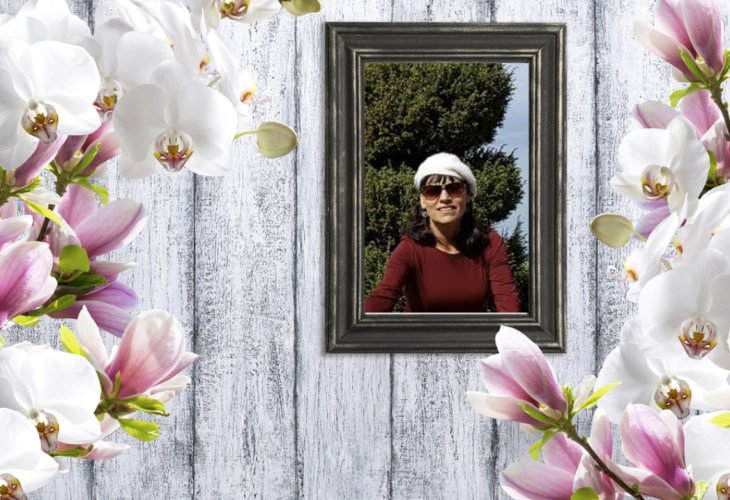"I Shouted to the Doctor: 'I Want to Live,' and He Cried: 'Sorry, We've Done Everything'"
A blood clot rampaged through Tzivia Hasson's body, threatening her life. Doctors had given up, and it seemed almost certain she was near death. Then, she made two commitments that changed everything. "Hashem can do anything," she says in a moving interview, "You just have to ask."
 (Inset: Tzivia Hasson)
(Inset: Tzivia Hasson)"I didn’t want to die; I wanted to go home and raise my children, but I understood my condition was extremely severe," Tzivia Hasson says, shivering and with a trembling voice. 21 years have passed since that difficult time when she experienced the greatest trauma of her life, finding herself in a complex medical situation and being told that only a miracle could keep her alive.
"I’ll never forget those moments," she says, "I don’t know why I was fortunate enough that Hashem sent me salvation, but I know my mission is to tell this story so people will understand that even in very difficult situations, you must not despair, and they will also understand the immense value of the commitments we make—value that, in my case, gave me life."
"In the Best Case, You'll Lose Two Legs"
21 years ago, Tzivia was a few days after the birth of her fourth daughter. "A sweet and beautiful baby girl was born," she recounts, "Although I didn’t feel well right after birth, there was a major doctors' strike at that time, and no one addressed my complaints. Thus, I was discharged, even though I felt something was not quite right.
"Three days later, I felt terrible pain. I went to shower and suddenly couldn’t breathe. I shouted to my husband that I needed to go to the hospital, and then I noticed that my leg turned purple. It didn’t take a genius to understand that something was wrong, and I already suspected that there might be a blood vessel blockage.
"We didn’t have much choice; we took the baby, who was then ten days old, left her with my husband’s 75-year-old mother, and rushed to the clinic, where they urgently referred us to the hospital's full and busy ER, thanks to the doctors' strike. They only noticed me because I was half fainting."
What did the doctors say? Were they startled by your condition?
"It was probably the terrible combination of a purple leg with significant difficulty in breathing that made the doctors order a duplex scan to check my veins. I underwent the test two hours after arriving at the hospital, and the whole time I suffered unbearable excruciating pain. The childbirth pains were nothing compared to what I went through at that time."
 (Photo: shutterstock)
(Photo: shutterstock)Meanwhile, Tzivia's husband was planning the big party for the birth of their daughter. "He didn’t even realize the complicated situation; he didn’t think we would spend long weeks in the hospital," she recalls.
But very quickly, he became aware of his wife's severe condition. "I was torn by physical pains in my legs," Tzivia describes, "and suffered emotionally because I couldn’t nurse my baby and was filled with concern and guilt for the three older children left without a father or mother."
Only in the evening did the doctors return to her with an answer. "The test results came, and they are not good; you need more intensive treatment," she was told. Tzivia, in her innocence, thought it was an antibiotic treatment, but then a doctor appeared in the room and explained to her that she had a clot in her leg blocking blood flow, putting her in mortal danger. According to her, the only thing that could help was a new and special treatment they had little experience with.
The next hour was a race against time: "My husband tried to inquire through private healthcare and medical contacts, but the more he inquired, the more it became clear that the treatment being offered to us was simply not easy. In the end, my husband spoke with a well-known medical contact who asked to speak with me. He laid the truth on the table and said: 'Your condition is not simple; one of your legs has a blood clot, and the condition of the other leg is bad. If you don’t undergo surgery, in the best-case scenario, you’ll lose two legs.' When I asked what would happen in the worse-case scenario, he was silent, then said: 'It’s better not to think about it.'"
Tzivia didn’t need more to give her consent to the treatment, and she found herself transferred to the operating room. "I remember those critical moments when I realized the severity of the situation, praying to Hashem, saying one thing only: 'If you save me from all this, I promise to strengthen in modesty and not wear pants again.'" Tzivia stresses that this was a big commitment for her since she always defined herself as traditional but until then had not paid attention to modest dress. "I was 37 then and knew my life would not look as they did before. With this commitment, I entered the treatment."
"My Sister Told Dad in a Dream: 'Keep a Place for Tzivia'"
The surgery, which was supposed to last two hours, eventually took about six. "It was treatment with local anesthesia, so I suffered from pain and was very drowsy and didn’t quite understand what was happening around me," describes Tzivia.
But one chilling detail remains with her from those hours: "I had a very scary dream. I saw my father, who passed away about a year earlier, digging around my house, and my older sister approached him and said: 'Dad, keep a place for Tzivia.' When I woke up from the treatment, I was very frightened because I understood it wasn’t a good dream."
Just then, her sister-in-law came to visit and heard about the incident from her. "My sister-in-law was very close to a well-known rabbi. She asked for my permission to approach him and give him my name for prayer. I gave my approval, and then after a few minutes, she returned to me and said that the rabbi told her that my condition was not good, so the baby's name needed to be changed. The name given a few days earlier was 'Liat Aviah.' The rabbi said it wasn’t a good name and needed to be changed to 'Leah Nechama.' My initial response was: 'Why? It's a name of the ultra-Orthodox!' But my sister-in-law pleaded, and I eventually said: 'If this will save me, let her be called 'Leah Nechama.'"
But soon another turn occurred. "About ten minutes later, the rabbi contacted my sister-in-law and said, 'I understand your sister-in-law's condition is critical; she is walking on a tightrope and needs an immediate name change, but not to 'Leah Nechama,' to 'Nesia,' because only a miracle from heaven will save her.'"
And is that really what you named the baby?
"Yes," Tzivia replies, her voice choking, "that same day, my husband went to the synagogue to change the name. Shortly after, the doctors came and told him they had to take me back to the operating room because the test results weren’t good. There is some component in my blood that reacts in an inverse way, so the situation is only getting worse."
Did you understand your situation?
"Of course, I understood. I knew I didn’t want to die; I want to return home and raise my children. Meanwhile, my sister-in-law arrived with cotton wool soaked in special oil as a good omen, they also performed spiritual redemption for me, and my feeling was that with the rabbi's blessing, spiritual redemption, name change, and my great commitment to modesty, the treatment must succeed."
Entering the operating room, the doctors laid Tzivia down and told her they were going to consult a professor about the treatment. "Meanwhile, I dozed off; a few seconds passed, but to me, it seemed like an eternity. I remember total darkness around me; I didn’t see anything, only darkness. I felt myself rising... I tried to call the doctors, but my voice didn’t come out. Eventually, a ray of light came, and a few minutes later, the doctors and surgeon appeared.
"Then the lead doctor said to me: 'We are really sorry, but there is no point in continuing the treatment because it will not be effective.' Suddenly, I understood my situation and the meaning of their words. I interrupted the doctor and cried out: 'But I don’t want to die; we will do everything for the treatment to succeed—we will sell our house, go abroad for treatment, anywhere in the world, whatever you say—we will do.'
 (Photo: shutterstock)
(Photo: shutterstock)"The doctor himself cried when he said to me: 'Madam, I am very sorry. We've exhausted the maximum we can offer from a medical standpoint. What remains is only to pray.'
"In the end, it was still decided to try to treat me. They put me on the operating table, and while overhearing them discussing this being only the third time they were performing this treatment—successful with the first patient, failed with the second, and I was the third patient where the treatment succeeded partially."
Needles and tubes were inserted into both of Tzivia's legs; the pain was terrible, and the treatment passed, but it was still unclear how successful it had been. "I was transferred to intensive care, where I was hospitalized for over a month, with doctors constantly very skeptical about my condition, reporting internal bleeding, ups and downs, and major uncertainty about the future."
"I Put on the Head Covering and Felt Something Happening"
Tzivia remembers her days in intensive care quite vaguely. "I was drowsy from the medications, but I knew my condition was bad, and also knew I missed my children desperately. Meanwhile, my husband’s mother herself needed to undergo medical treatment around that time, so she was hospitalized. We were in a situation where the tiny baby grew up at her uncles’ place, the older children were tossed from house to house, and I lay in a critical condition when no one knew what the future held for me."
One day, Tzivia's sister-in-law arrived at the ward and told her that the rabbi called her, expressing interest in her condition. "I told him you are still hospitalized and he said it might be worthwhile for you to take on another commitment," she said to her.
Tzivia mentions that at first, she felt a type of anger and told her sister-in-law: "I already took on not wearing pants anymore." But her sister-in-law insisted: "The rabbi recommended you keep your head covered."

At that moment, Tzivia broke down. "It seemed illogical to me—I work in a secular school; the teachers next to me in the staff room eat ham sandwiches with coffee with milk—does the rabbi want to make me a spectacle? I pleaded with my sister-in-law to leave me and put aside this bizarre idea. My sister-in-law really left, but my husband pleaded and cried like a small child: 'Please, you see that nothing else is helping. Try this; commit to covering your head.' I repeatedly said 'no', but my husband insisted, announcing he would not leave me and did not go to work until I committed.
"Eventually, I said to him: 'Without a vow, I will wear a head covering,' but my husband wasn’t satisfied with that. He told me: 'Say it with a vow,' and I, who just wanted him to leave me alone, committed: 'With a vow, I will wear a head covering.' Only then did my husband agree to leave, and I was left in the hospital with the knowledge that I committed to the biggest thing in my life."
A few days later, the rabbi himself came to visit Tzivia in the hospital. "The doctors allowed me to be disconnected from the machines for about 20 minutes so that I could talk to the rabbi," she recounts, "and the conversation with him was emotional, gentle, and so respectful. After he explained to me the great importance of head covering for a married woman, I told him: 'I understand, and I also know that I vowed, so I must keep it.' Then the rabbi asked me: 'If I tell you this moment to cover your head, will you do so?' And I answered 'yes.' At that moment, the rabbi turned to my husband and asked him: 'Go buy your wife a head covering.' My husband intended to buy it from the gift shop under the hospital, but the rabbi stopped him and announced: 'Go to Me'a She'arim and choose a respectable head cover for Shabbat and a head cover for every day.'"
Tzivia pauses her speech, her voice excited: "It's amazing to see the power of prayer and faith, and how great Hashem’s power is. My husband bought me that day a beautiful white head scarf and a beautiful elegant hat; he also hung a large poster with the inscription 'The Angel who redeems me.' Then I blessed: 'Blessed are You, who has kept us alive and sustained us and brought us to this time,' tying the scarf around my head, and I felt something happening in my body. I couldn’t explain what exactly, but a few hours later, the doctors took blood tests from me and announced my condition was improving. Within 24 hours, the doctor informed me I was being moved to a regular internal ward. He himself didn’t know how to explain what happened, and how after nearly five weeks of being in critical condition my condition got better, but I understood something beyond nature happened here."
When Tzivia was transferred to the internal ward, something else significant happened. "I saw a big event around me, but my husband and family insisted on keeping the curtain closed. Suddenly, my husband appeared dragging a crib. It was my sweet baby. I will never forget that moment my entire life. I cried, laughed, kissed her, I couldn’t leave her... Eight days later, the miracle was complete when I was discharged from the hospital."
* * *
Tzivia's healing process wasn’t finished in a day. "It took many months until I was weaned off the medical walker—something none of the doctors believed would happen, later I used a cane, and eventually, I didn’t even need that," she explains, also adding: "I tell my story 21 years after it happened and feel the miracle accompanies me to this day. Master of the world has given me life as a gift, and every morning when I rise and mumble 'I thank you,' I mean every word. Hashem is the only one who cares for us and performs miracles for us, we just need to give of ourselves and ask."

